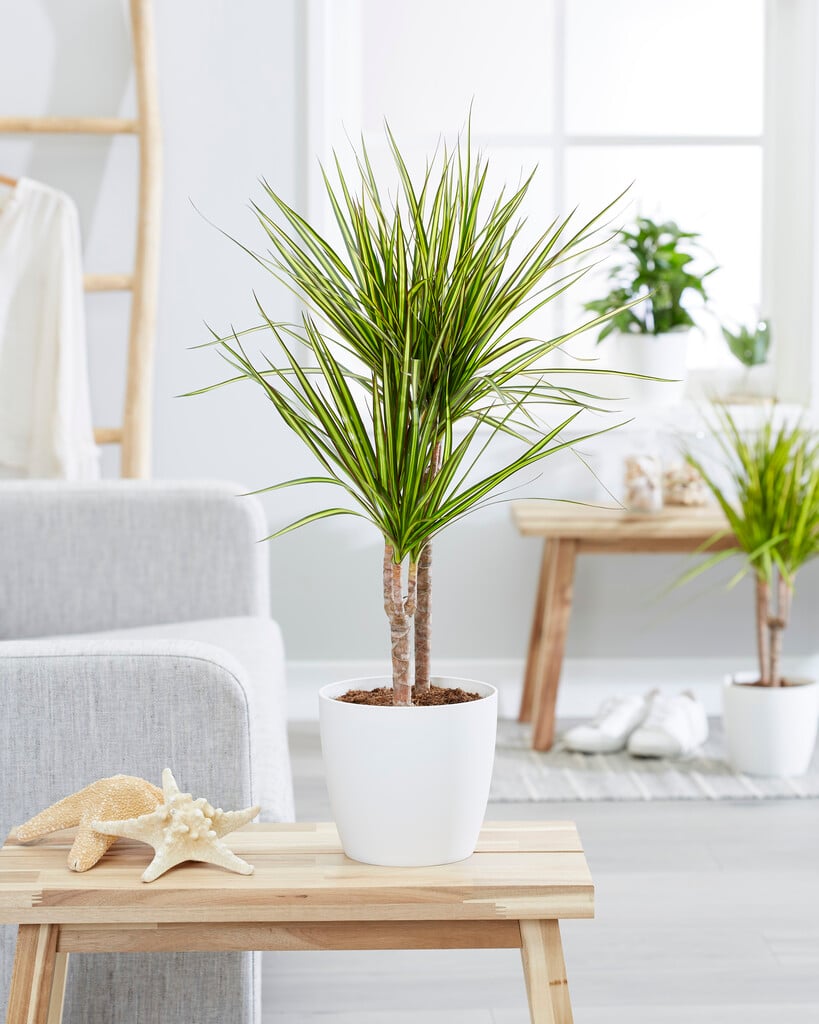Dracaena marginata 'Sunray'PBR (v)
Madagascar dragon tree 'Sunray'
A tropical evergreen shrub, with an upright habit and sparsely branching stems. Leaves are long and narrow, deep green with yellow centres, and are clustered at the tips of the stems

Buy this plant
Size
Ultimate height
1.5–2.5 metresTime to ultimate height
5–10 yearsUltimate spread
0.1–0.5 metresGrowing conditions
Moisture
Moist but well–drainedpH
Acid, Alkaline, NeutralColour & scent
| Stem | Flower | Foliage | Fruit | |
| Spring | Green Yellow Variegated | |||
|---|---|---|---|---|
| Summer | Green Yellow Variegated | |||
| Autumn | Green Yellow Variegated | |||
| Winter | Green Yellow Variegated |
Position
- Full sun
- Partial shade
Aspect
East–facing or South–facing or West–facing
Exposure
Sheltered Hardiness
H1BBotanical details
- Family
- Asparagaceae
- Native to GB / Ireland
- No
- Foliage
- Evergreen
- Habit
- Columnar upright
- Potentially harmful
- Pets (dogs, cats, rabbits, rodents): Harmful if eaten. For further information and contact numbers regarding pets, see the HTA guide to potentially harmful plants
- Genus
Dracaena are evergreen trees, the few branches bearing linear to lance-shaped leaves often crowded towards the tips; on mature plants, small greenish-white flowers may be followed by orange or red berries
- Name status
Accepted
How to grow
Cultivation
Grow in peat-free, loam-based potting compost, in full light with shade from hot sun. Water moderately in the growing season, preferably with rainwater as plants dislike tapwater. Apply a balanced liquid feed monthly in the growing season; water sparingly in winter. Top dress or pot on in spring. See Dracaena for further advice
Propagation
Propagate by semi-ripe cuttings in late spring to early summer; bottom heat may be required for rooting
Suggested planting locations and garden types
- Houseplants
- Low Maintenance
- Conservatory and greenhouse
Pruning
No pruning required, although weak stems may be shortened to 15cm in spring, and the resulting cutting used to propagate a new plant
Pests
May be susceptible to scale insects, glasshouse red spider mite, thrips and mealybugs
Diseases
Generally disease-free
Get involved
The RHS is the UK’s gardening charity, helping people and plants to grow - nurturing a healthier, happier world, one person and one plant at a time.